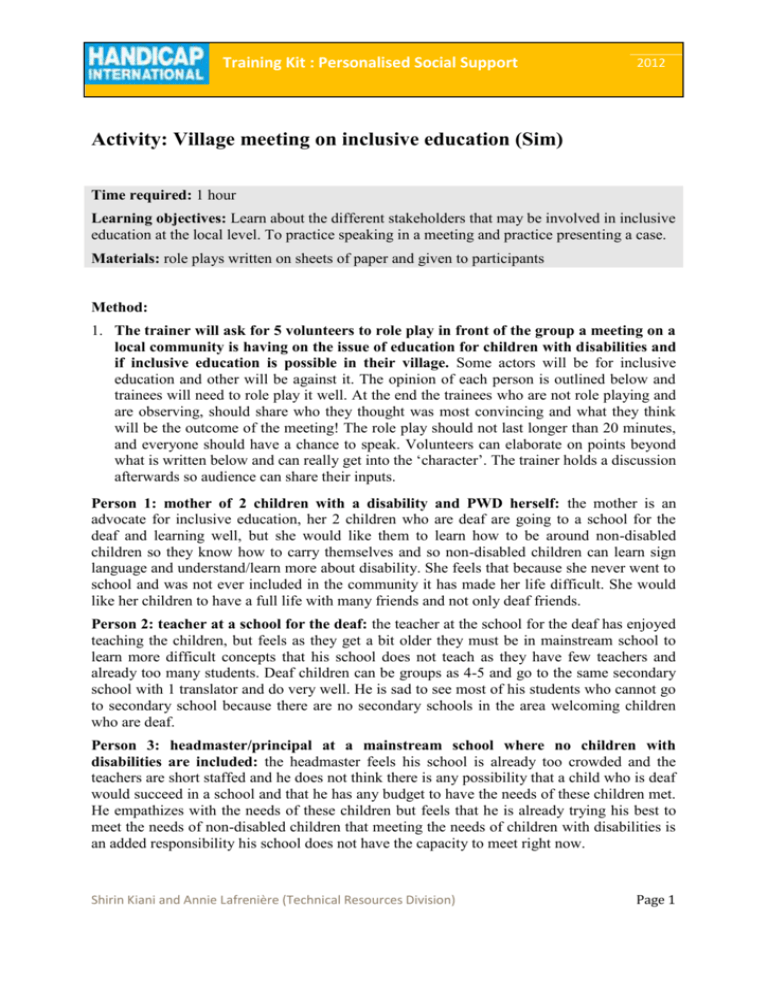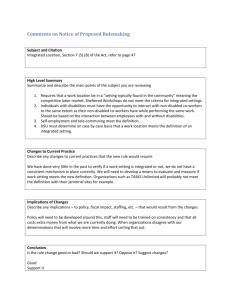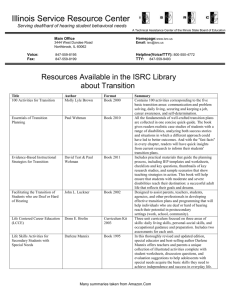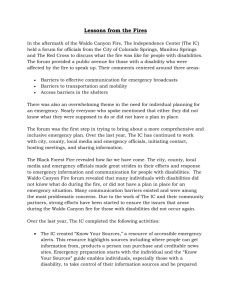Activity 8 : Interacting with a person with disabilities (Do) – 1.5 hours
advertisement

Training Kit : Personalised Social Support 2012 Activity: Village meeting on inclusive education (Sim) Time required: 1 hour Learning objectives: Learn about the different stakeholders that may be involved in inclusive education at the local level. To practice speaking in a meeting and practice presenting a case. Materials: role plays written on sheets of paper and given to participants Method: 1. The trainer will ask for 5 volunteers to role play in front of the group a meeting on a local community is having on the issue of education for children with disabilities and if inclusive education is possible in their village. Some actors will be for inclusive education and other will be against it. The opinion of each person is outlined below and trainees will need to role play it well. At the end the trainees who are not role playing and are observing, should share who they thought was most convincing and what they think will be the outcome of the meeting! The role play should not last longer than 20 minutes, and everyone should have a chance to speak. Volunteers can elaborate on points beyond what is written below and can really get into the ‘character’. The trainer holds a discussion afterwards so audience can share their inputs. Person 1: mother of 2 children with a disability and PWD herself: the mother is an advocate for inclusive education, her 2 children who are deaf are going to a school for the deaf and learning well, but she would like them to learn how to be around non-disabled children so they know how to carry themselves and so non-disabled children can learn sign language and understand/learn more about disability. She feels that because she never went to school and was not ever included in the community it has made her life difficult. She would like her children to have a full life with many friends and not only deaf friends. Person 2: teacher at a school for the deaf: the teacher at the school for the deaf has enjoyed teaching the children, but feels as they get a bit older they must be in mainstream school to learn more difficult concepts that his school does not teach as they have few teachers and already too many students. Deaf children can be groups as 4-5 and go to the same secondary school with 1 translator and do very well. He is sad to see most of his students who cannot go to secondary school because there are no secondary schools in the area welcoming children who are deaf. Person 3: headmaster/principal at a mainstream school where no children with disabilities are included: the headmaster feels his school is already too crowded and the teachers are short staffed and he does not think there is any possibility that a child who is deaf would succeed in a school and that he has any budget to have the needs of these children met. He empathizes with the needs of these children but feels that he is already trying his best to meet the needs of non-disabled children that meeting the needs of children with disabilities is an added responsibility his school does not have the capacity to meet right now. Shirin Kiani and Annie Lafrenière (Technical Resources Division) Page 1 Training Kit : Personalised Social Support 2012 Person 4: social facilitator working in the area: the social facilitator in the area understands that parents of children with disabilities want equal right/access of their children to public schools and for teachers to be more open/welcoming to their children. He also understands the constraints of the local headmaster and education office, mainly dictated by the budget. However, he feels that this is not a question of budget and that children with disabilities are excluded because the budget is not adequate. Children with disabilities should not be the first ones to be excluded because the budget is low and feels other adjustments need to be made so the budget meet the needs of these children too. Person 5: representative from local education office: the local education office is the one holding this meeting and very interested in what everyone has to say. The education office is aware that the UNCRPD was signed last year and that there may be some national laws coming soon about trying to include children with disabilities. He is not sure if this is a good idea of if the current way things are going is best both for his budget and for children with disabilities. Shirin Kiani and Annie Lafrenière (Technical Resources Division) Page 2







